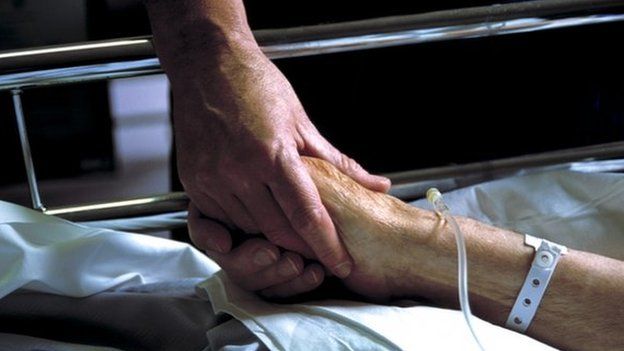Patients should have 'right' to end-of-life care, say MSPs
- Published

Everyone should have access to specialist end-of-life care, not just cancer patients, according to MSPs.
Holyrood's Health and Sport Committee has published the findings of its report into palliative care.
It said there may be 10,000 people in Scotland not getting care they need.
It said those with terminal illnesses other than cancer, the homeless and those with learning disabilities were less likely to receive palliative care at the end of their lives.
The committee stressed that care for those who are approaching the end of their life should be based on need, and not what condition they are diagnosed with.
The MSPs said there is "a perception that cancer patients receive better palliative care".
'More consistent'
While increasing numbers of people with other terminal conditions are on the palliative care register, the committee's report said "there still remains an issue with access to palliative care for people with non-malignant diseases".
Calling for palliative care to be a right, committee convener Duncan McNeil said: "Our committee came to a firm conclusion that everyone who needs it should be able to access high quality, person-centred palliative care.
"We heard that this is not happening on a consistent basis and that people across Scotland have a different experience depending on where they live, their age and their condition."
A report for the committee by Prof David Clark of Glasgow University suggested that more than 10,000 Scots who could benefit from palliative care towards the end of their life died without receiving it.
The committee also heard evidence that the homeless and people with learning difficulties were less likely to receive this form of care.
They argued there was a "need for access to palliative care to be more consistent across all conditions, ages and locations", calling for this to be addressed in the framework for palliative and end-of-life care being developed by the Scottish government.
The framework should also look at training, with the committee saying there was a need for all health professionals to be "comfortable in initiating conversations around death and dying".
'Important that change comes'
Mr McNeil said: "Conversations around death and dying are never easy. But palliative care is about giving people the best quality of life regardless of how long that may be for.
"This report is not about policy in isolation but people. The provision of good quality palliative care affects us all whether as parents, children, or as carers of loved ones.
"It's important that change comes as a result of this inquiry and more work is undertaken by the Scottish government to find out why people are not getting the care they need."
Health Secretary Shona Robison welcomed the report and said the Scottish government's strategic framework on palliative and end-of-life care was due to be published by the end of the year.
She added: "This framework will help ensure that everyone in Scotland - infant, child, young person or adult - no matter where they live and no matter what clinical conditions they have, will receive care from a health and social care system that recognises when time is becoming shorter.
"It will be supported by £3m funding over three years. The committee's report will help inform the development of this framework."
- Published4 November 2015
- Published15 September 2015
- Published2 July 2015
- Published28 May 2015
- Published27 May 2015